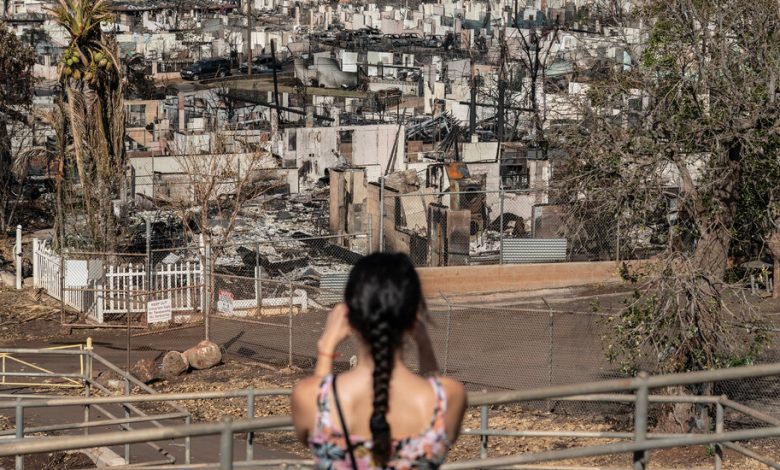Climate Change Is Forcing Families Into a New Kind of Indefinite Hell

The August wildfire that roared through the town of Lahaina in Hawaii burned so hot that some of the dead were effectively cremated, their bones combusting to unidentifiable ash. Other bodies may have been lost in the Pacific Ocean, into which many of those fleeing the inferno were forced to plunge. As of Sept. 22, 97 people have been confirmed dead, but the Maui Police Department still lists 22 people as missing.
That’s a common pattern in the aftermath of disasters. In Morocco, families are still desperately searching for hundreds of loved ones after a devastating earthquake, while thousands in Libya are missing after two dams collapsed in a heavy rainstorm. Climate change has supercharged the kind of deadly weather that creates disappearances. In March, over 500 Malawians were presumed dead after being buried in mudslides unleashed by the exceptionally intense Cyclone Freddy. For families of the missing, disappearance is a special kind of indefinite hell. In a wealthy country like the United States, victims of disaster tend to be quickly tallied and searched for. But poorer nations, which are already more vulnerable to the damage wrought by climate change, often don’t have the resources to follow through. We need to fund measures for these countries that both prevent disappearances through emergency preparedness and also resolve them by promptly identifying bodies. The nations responsible for the most climate pollution have a moral responsibility to help families left in limbo.
In addition to intensifying disasters, climate change is also leading to disappearances through migration and conflict. Some years ago, one of us, Dr. Wolfe, visited refugee camps on the Greek islands of Lesbos and Chios to learn more about migrants who had disappeared while trying to reach Europe. Malnutrition, hunger and famine linked to new climate conditions have pushed more Africans to undertake the perilous journey across the Mediterranean and more Latin Americans to travel through Central America and into Mexico. Tens of thousands have disappeared. Rising temperatures have also made these passages more lethal as migrants die of heat exhaustion while trekking across deserts and asphyxiate inside metal shipping containers.
What was most striking on Lesbos and Chios was both the sheer number of people who seemed to be missing and the loneliness of their relatives’ investigations. There was no government agency their families could turn to for the help they needed, no nation willing to invest resources in searching for someone who had disappeared while crossing borders.
Without a body to bury and visit, a loved one’s death, however likely, remains uncertain. This form of ambiguous loss makes grieving difficult if not impossible, forestalling funerals and pushing many kin of missing persons into a potentially endless search. More practically, such absences can deprive surviving relatives of a breadwinner while also creating legal difficulties in receiving a declaration of death. Even if a person is declared dead, the wound of disappearance frequently remains unhealed. Years later, against ever thinning odds, families of the missing are still seeking some proof of their loved one’s life or death.
We need more resources for the climate missing, but we also need better data. Right now, we don’t even know the number of people who have disappeared because of climate change. Unless we get some sense of what disappearance actually looks like and how it happens, it’s going to be much harder for governments to respond to the problem — and much easier for them to ignore it.
A big part of the problem is that the people who are most exposed to the ravages of climate change are also the people who are already most likely to slip through the cracks if they disappear. Although we are all affected by extreme weather, the well-off are largely insulated from harm, while the already marginalized suffer. It is probably no coincidence that Lahaina had an outsize population of people experiencing homelessness who were poorly equipped to withstand extreme weather. Put bluntly, many of the missing are not people who, collectively, we seem to miss, so there is little pressure on governments to find them.
“A lot of the people we deal with don’t have connections with family,” said Scott Hansen, the executive director of the Maui Rescue Mission, a group that works with unhoused people and has helped lead efforts to find some who disappeared in the fires. “There’s no next of kin to contact, so when they do go missing or pass away, they end up being forgotten.”
For governments, searching for missing persons can be a hassle. The ad hoc work of finding and identifying remains after a disaster, drawing on forensic anthropology and DNA matching, is slow and expensive. While international pacts have created rules for locating the missing, these agreements often go unheeded. Disappearances can still exist in a bureaucratic “gray zone” where no nations take responsibility for corpses. Many of those who become lost at the border and in the sea are never identified, often through a lack of money and political will.
We need more cooperation between countries. We also need a clear, equitable division of global responsibilities in resolving disappearances. Wealthy states should invest in initiatives in poorer countries that aim to both prevent individuals from disappearing in the first place and resolve the fate of those already dead. They must also sponsor disaster preparation and emergency responses that can save lives in the immediate aftermath of a catastrophe, as well as the identification of bodies later on, including funds for coroners to collect identifying biometric data like tattoos and fingerprints.
How can rich nations help? In Lahaina, the F.B.I. and Maui Police Department cooperated to send out calls for information about who was missing and under what circumstances they disappeared. The authorities then quickly published a list of the names — crucial information in the search for the disappeared. Phone lines remained opened for days to gather information, while investigative teams ran down cases. As a result, the number of people still unaccounted for plummeted from hundreds down to a few dozen after just a few weeks. Libya and Morocco don’t have the same systems and resources to pull off similar efforts. But funding their search of missing persons could help.
Better emergency preparedness can also prevent disappearances. Wealthier governments like the United States have the ability to publicize detailed plans on what citizens should do during natural disasters. They can also save lives by maintaining infrastructure and enforcing building standards. If poorer countries can’t afford these lifesaving measures, it’s incumbent upon richer nations to help them.
Missing persons posters can still be seen in Maui, though the likelihood of spotting someone alive has grown slim. They function now less as tools of surveillance than as petitions for aid — silent pleas for the sacred right to grieve.
Matthew Wolfe is a national fellow at New America. Malcolm Araos is a postdoctoral fellow at the Wilkes Center for Climate Science and Policy at the University of Utah.
The Times is committed to publishing a diversity of letters to the editor. We’d like to hear what you think about this or any of our articles. Here are some tips. And here’s our email: [email protected].
Follow The New York Times Opinion section on Facebook, Twitter (@NYTopinion) and Instagram.



